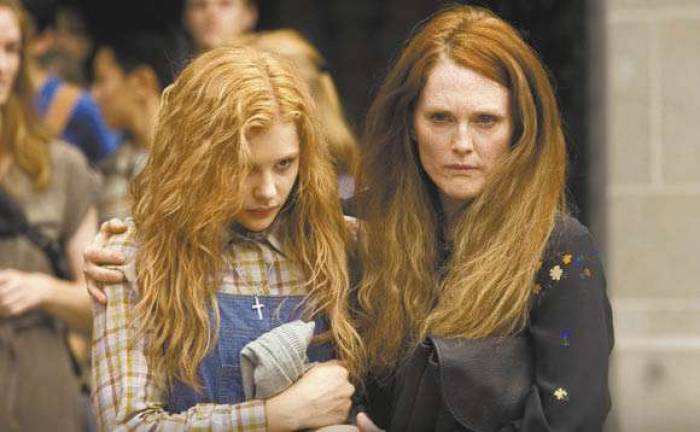Stop Carrie-ing On

DePalma's classic trashed in remake
It was impossible for Kimberly Peirce to direct a remake of Carrie that could live up to Brian DePalma's 1976 original. Two cultural events got in the way.
First, political correctness so dominates our culture that the mythological aspects in Carrie's reverse-Cinderella story (a repressed, unpopular high school girl goes to the senior prom where vicious students humiliate her) are undermined. The story's most captivating elements--Carrie's emerging sexuality, guilt imposed by her mother's religious pressure, her schoolmate's moral confusion--are politicized, made into social problems worthy of the TV-series Glee's insipid "It Gets Better" nostrums, then drained of mystery and imagination.
Second, TV style so dominates our culture that DePalma's cinematic sophistication--an essential part of the original film's modernism, finding meaning in imagery, kinetics and cultural resonance--has been replaced by flat, ordinary technique and the cynical narrative expectations of the dumbed-down 21st century audience.
Peirce directs this remake with a depressing, plot-oriented single-mindedness. That's what political correctness and TV style have led to: a version of Carrie that is reduced to a few faint lesbian teases and feminist alarum (Carrie's fanatical, repressed mother is a cutter who injures herself) and an anti-bullying message (at an inquest following the prom massacre). This desperately commercial, simplistic interpretation of Stephen King's story offers none of the sensuality or boldness of Pierce's debut film, Boys Don't Cry. Peirce's Carrie truly is a horror story, just an occasion for snarky meanness, grisliness and mayhem--as in the revenge Carrie takes on the couple that plotted against her: the entire automobile demolition is shown methodically, no longer an impulsive act with a edge of vengeance but calculated brutality like today's sadistic horror films.
DePalma's horny-visionary humor is what made Carrie so American American--a horror satire but with deep feeling and real ambivalence. It's a hallmark of the 70s era that a film as funny as Carrie could also be so heartbreaking.
The mother's warning "They're all gonna laugh at you!" did double-duty; the funny-heartbreaking Carrie transcended its Grand Guignol genre, but no one's gonna laugh or cry at this literal-minded remake. The pig-slaughter scene ("Choose one that looks like Carrie") becomes a moment of mean-girl internalized self-hatred and the bucket-of-bloodbath is repeated three we-got-the-point times. TV-obviousness striking again and again and again.
Stefan Sharff, the great film theoretician, devoted an entire class of his "Analysis of Film Language" Course at Columbia University to DePalma's Carrie (at my suggestion, and my everlasting gratitude). Sad that Columbia Film School graduate Peirce remakes Carrie using such meager film language.
It was DePalma's satirical sensibility that gave unexpected complexity to Stephen King's potboiler, plus DePalma's visual wit added layers of meaning through art and pop cultural references. The Pre-Raphaelite close-ups (of Sissy Spacek, Piper Laurie, William Katt, Amy Irving and Nancy Allen) allowed DePalma to raise the mystical elements of the story to an esthetic richness that resolved the theme of repressed sexuality. (The mother's lush hair suggested her innate sensuality but is made stringy and witchy here.) Depicting Carrie's forced closet penitence, DePalma's great cinephilia reached back to evoke Lillian Gish's anguish in Broken Blossoms and for the mother's orgasmic death he reached forward, outdoing Luis Bunuel's wildest iconography.
All this is why DePalma's Carrie ranks as one of the great American movies and its characters are cultural archetypes--despite a previous remake, a previous sequel and a Broadway musical, DePalma's film has had huge influence stretching from P.J. Harvey to the excellent recent Disney film Prom. DePalma's Carrie is one of those films where everything went right but except for Chloe Grace Moretz's sweetly vulnerable expressions, everything in Pierce's remake goes flat.